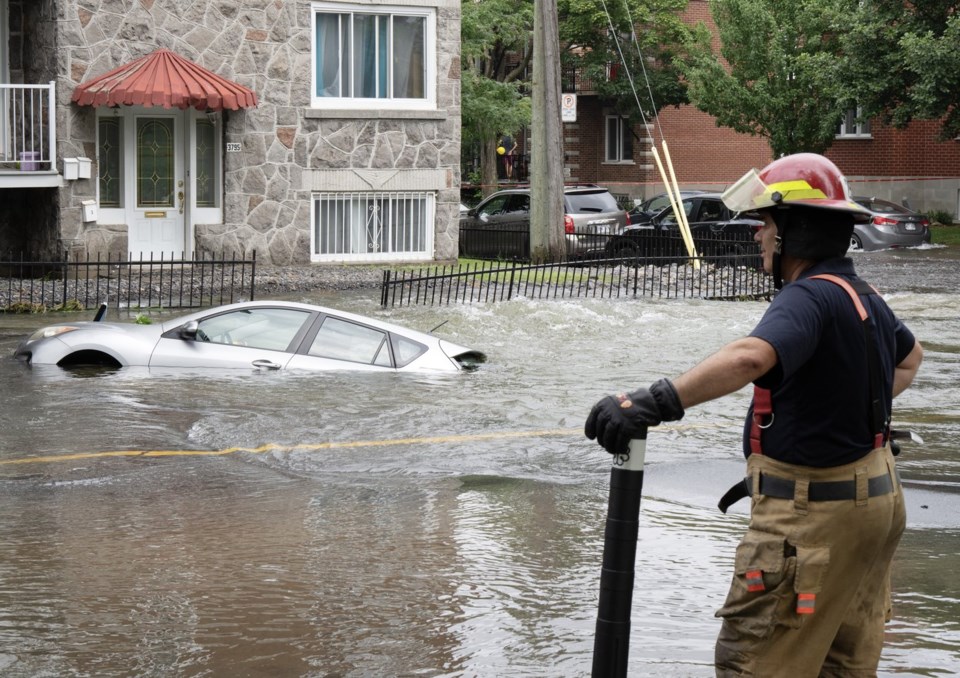MONTREAL — Pasquale Monaco says he’s debating whether to keep renting out the two-bedroom basement apartment of the Montreal building he owns after it was flooded — again — in August, when the remnants of tropical storm Debby sent four feet of water rushing into the space.
Monaco says the basement of the five-unit building in the St-Leonard borough has been flooded eight times in the last five years, including five times with more than three feet of water.
“I don't feel right renting it to anyone because I already know that down the line they're going to lose everything they have,” he said in a phone interview.
Last week, in comments to Montrealers whose homes had been flooded, a member of the city's executive committee said that living in basement apartments may eventually become a thing of the past — at least in some places.
“I think that in the future we won’t be able to have any more housing in the basement,” Maja Vodanovic, responsible for waterworks at the city, told a council meeting.
While Montreal’s mayor later said that any bylaws limiting basement apartments would apply only to new construction in specific flood-prone areas, some experts and insurers are saying it's time to have a conversation on where and whether below-ground dwelling is feasible as extreme rainfall events become more common.
The Insurance Bureau of Canada recently described the Aug. 9-10 flooding caused by the remnants of Debby as the costliest severe weather event in Quebec’s history, surpassing the 1998 Ice Storm, with an estimated $2.5 billion in insured damage.
A large number of the 75,000 personal property claims stemming from Debby were due to basement flooding, Craig Stewart, a vice-president with the insurance bureau, said in a phone interview.
“It's fair to say that basement flooding has cost in the hundreds of millions or even billions in certain years across Canada,” he said.
Flooding, which can occur from rain, rising rivers or sewer backups, can be both costly and dangerous, he said. Mould, destroyed flooring and drywall, and even damage to a home’s structure can occur. Floods can also ruin belongings and be fatal, he added.
As those events become more frequent, he said some insurance companies are limiting coverage, raising prices for flood insurance in areas deemed at higher risk, or declining to offer it altogether.
“Increasingly those situations are becoming uninsurable,” he said, adding, “We think that taking a careful look at where people are allowed to live in basements is prudent.”
Joanna Eyquem, managing director of climate resilient infrastructure for the University of Waterloo-based Intact Centre on Climate Adaptation, says flooding is happening as climate change brings more episodes of "short duration, very intense rainfall" that cannot be handled by urban drainage systems.
She said several things can be done, including updating sewer systems, building retention ponds and working with homeowners to ensure their drainage systems are strong. Another solution is to try to "work with nature" to create spaces that absorb water and send less of it into sewers, as Montreal is doing with its network of so-called "sponge" parks and streets, Eyquem said.
However, she said it makes sense for homeowners in places that flood frequently, sometimes because their homes are built in low-lying areas or above paved-over former rivers, to reconsider living or keeping valuables there.
At the city council meeting, a series of St-Leonard residents asked Vodanovic and Mayor Valérie Plante why the city wasn't doing more to stop the flooding, including by building retention basins or enlarging sewer collectors. One citizen, who said he had four basement tenants, said his street floods twice a year.
"In November it will flood again, I don't know what to do anymore," said the man, adding he was going to stop renting his basement.
Vodanovic said that while the city is updating its sewers and its drainage, it would take 10 or 20 years to complete the job, "and even that would not solve the problem of flooding with 150 millimetres in one day," she said.
Gonzalo Lizarralde, a professor at Université de Montréal, said it's theoretically possible to build watertight basements, as well as massive sewer infrastructures that significantly lower the risk of flooding. However, he said the cost to build and maintain such structures is a major factor.
"Everything is possible," he said. "The problem is, how feasible with limited resources and with real-life conditions is it to do it?"
Monaco says the city hasn't made an effort to fix the problem. He points out that losing basement apartments — usually among the most affordable options — also represents a cost for a city struggling with a housing crisis, and suggested that more people will end up homeless if they disappear.
"Maybe there'll be more people (camping) on Notre-Dame Street," he said. "Maybe then they'll react."
This report by The Canadian Press was first published Sept. 22, 2024.
Morgan Lowrie, The Canadian Press
